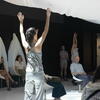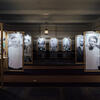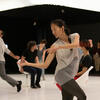Discovering the Selinsgrove Center
A discovery project to illuminate the complex history of institutionalization through the personal experience of those who live it.
Many institutional residents do not communicate in a traditional method and their voices often go unheard. Artists may be uniquely positioned to gather and interpret their stories. Working with a group of multidisciplinary artists and historians, the Institute developed an arts-based methodology and artist residency program. During the year-long project, pilot residencies were established on the grounds of Selinsgrove Center in central Pennsylvania, home to more than 220 people with intellectual disabilities. Participating artists included oral historian Nicki Pombier Berger, public historian Donna Graves, dancer KC Chun-Manning, and documentary photographer Ruddy Roye.
Funded by The Pew Center for Arts & Heritage.
A Fierce Kind of Love
A Fierce Kind of Love, a play written by Suli Holum, is a collage of stories of Pennsylvania's Intellectual Disability Rights Movement. A Fierce Kind of Love uses word, movement and song to examine this remarkable and largely untold history and to celebrate the struggle, activism and fierce love that fuels the desire for dignity. Directed by David Bradley. Performed by a mixed-ability cast.
Major funding for A Fierce Kind of Love was provided by The Pew Center for Arts & Heritage.
Here. Stories from the Selinsgrove Center and KenCrest Services
Here. Stories from the Selinsgrove Center and KenCrest Services introduces 19 people with intellectual disabilities who live and work in segregated settings in Pennsylvania. The settings are a state center and a sheltered workshop. These settings are unknown to many but are a real and often divisive part of our history. Here. provides insight into the lives of these Pennsylvanians through "narrators," 18 interviewers who visited the Selinsgrove Center and KenCrest Services in the spring of 2015.
Major funding was provided by The Pew Center for Arts & Heritage. Photographs by JJ Tiziou.
Hear or Read the HERE. stories
Visionary Voices: Interviews
Interviews with the leaders of Pennsylvania's Intellectual Disability Rights Movement.
A collection of stories from advocates, self-advocates and family members who took great risks to ensure the safety and freedom of people with disabilities in Pennsylvania. From the Right to Education, to the closing of institutions and the move toward self-determination, Pennsylvania has paved the way for national policies that have led to widespread reform.
Browse Visionary Voices Interviews
Visionary Voices: Archives
Preservation of personal papers collections significant to Pennsylvania's Intellectual Disability Rights Movement. In collaboration with Temple University Urban Archives, the Institute is engaged in the collection and preservation of personal papers collections that enhance our understanding of Pennsylvania's Intellectual Disability Rights Movement.
The Urban Archives is currently home to the personal papers collections of parent-advocates Dennis Haggerty, Leona Fialkowski, Eleanor Elkin and Audrey Coccia.
More about the Archives
For more information, contact
Lisa Sonneborn, Director, Media Arts & Culture
[click-for-email], Voice: 215-204-9542
Top of Page ↑



